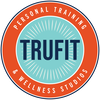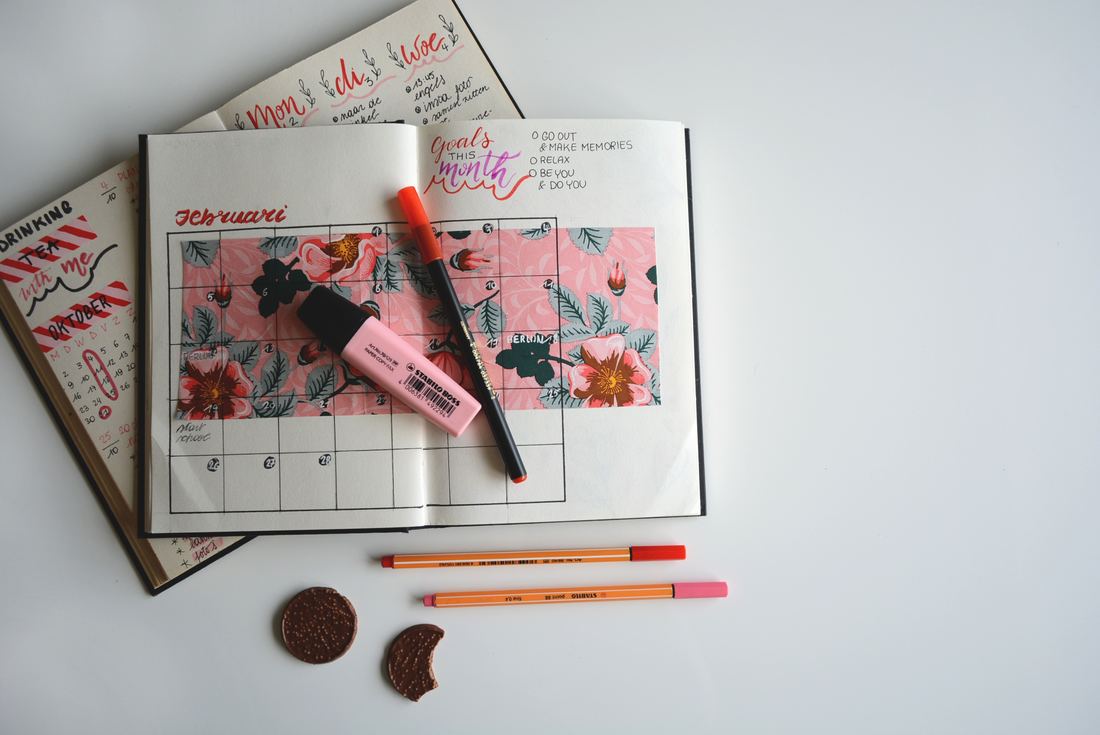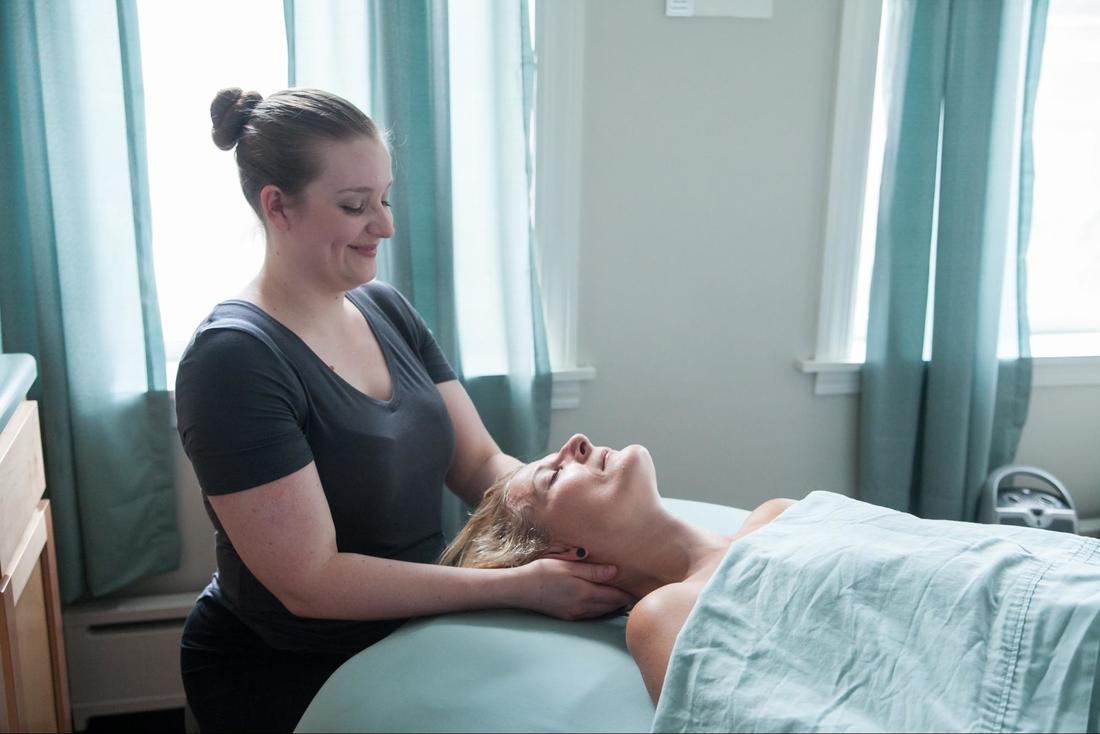|
(Guest post)--Hey TruFit readers! April is National Stress Awareness Month, which means it’s a wonderful time to talk self-care. To help us, we’ve handed today’s post over to Amanda Tarver, LMT. She is the owner and practitioner of Women’s Massage Therapy in downtown Evanston, where she offers a variety of women’s therapeutic bodywork, and pregnancy and postpartum services. We are thrilled to be sharing her self-care wisdom and tips here on the TruFit Blog! What Is Self-Care? Self-care can involve any regular activity (or activities) that we do specifically to take care of our physical, mental, and emotional needs. Self-care can mean different things to different people, and your own self-care needs may change many times throughout your life. Examples of self-care can include:
Self-care is not the same thing as pampering. Although treating ourselves to something special can be good for our emotional, physical, or mental well-being, pampering is generally something that we engage in rarely or inconsistently (Example: Enjoying a glass of Champagne on a Tuesday; spending an entire morning in bed with some aromatherapy and a good book; splurging on a piece of art or a pair of shoes that you love). Good self-care, on the other hand, requires regular practice, even though that practice may change. Why Should I Practice Self-Care? When we take the time to regularly care for ourselves and recharge, we are able to be our best selves. Think about it… do your best interactions with others occur when you are feeling well or when you’re feeling poorly? People who engage in regular self-care tend to be more productive, happier, healthier, and may even live longer. Their interactions with others tend to be more positive because they feel good, which leads to improved relationships, and fewer instances of anger, frustration, irritation, etc. Good stuff, right? So how do you get started? Self-Care Evaluation Exercise This exercise should help you identify the parts of yourself that are in need of more self-care, and allow you to develop self-care practices that make sense for you. As you’ll see below, I have broken this exercise down into three categories: body, mind, and spirit. When looking at the whole picture of our being, we can use these three categories to evaluate our health and wellness. Our physical body is everything that is tactile; it is our muscles, skeleton, organs, and tissues. Our mind is our thoughts and our knowledge; it is our worries, anxieties, or anything else that we think about or dwell on. Our spirit is our emotional body; it is our feelings, instincts, and intuition. Our spirit is what’s affected when we feel good, bad, or anything in between. It is important to have balance amongst the three, rather than just focusing all attention on one area. To complete this exercise, you can answer the same basic questions for each category to determine where you need the most work. Body (Physical) What do I do to take care of my body? Where do I struggle most when it comes to my body? What can I do to help with that struggle? Mind (Mental) What do I do to take care of my mind? What is my biggest worry? What can I do to worry less? Spirit (Emotional) What do I do to take care of my spirit or emotions? What makes me feel down? What can I do to improve my mood? If working on one thing for each category is too much right now, just focus on the category that needs the most attention. You can always add on when you’re ready. Sticking With Self-Care As you develop and implement your own self-care practices, you might occasionally struggle with consistency or lose motivation. This is totally normal. Self-care is a process, and over time it will evolve based on your goals, needs, and other life factors. Just remember to stay positive, avoid self-criticism, and take a little time on a weekly or monthly basis to check in on your wellness and self-care progress. To help you start strong (and stay on track), here are four self-care steps or reminders you can review whenever you’re feeling discouraged or overwhelmed: 1) Acknowledge what you are already doing well. Believe it or not, no one is starting from zero when it comes to self-care. We are all doing something right even if it is small. Maybe you consume 1-2 portions of veggies per day. Maybe you're very consistent with your sleep schedule. Look at the positives and think about how to build from there. Don’t focus on the negatives. For most of us, starting off on a positive note helps motivate us to do better. 2) Ask yourself what you can do better. This one is all about the wording. To continue with that positivity from the last step, ask yourself what you can do better instead of what you are doing wrong. The power that our words have is surprisingly significant. The word “better” is much more uplifting than the word “wrong,” making it a more positive motivation. 3) Set realistic goals. Setting realistic versus unrealistic goals can make or break your journey. Instead of focusing on the big picture and your intended outcome, focus on small, manageable changes that you can make to your lifestyle. When trying to make lifestyle changes, it is important to make small changes and schedule them. Example: Instead of saying “I will eat a healthy meal every day,” start by saying “I will eat a healthy meal once a week” (or whatever would be a small step up from what you are already doing). Next, schedule it. If you say “I will eat a healthy dinner every Wednesday night,” put it in your schedule, make sure to plan ahead by going grocery shopping or finding places where you can pick up healthy meals. Once you have made that one healthy meal a part of your regular routine, try adding in another meal, and then another. Before you know it, you will be eating regular healthy meals throughout your week. The same pattern can apply to just about any goal you set for yourself. 4) Be forgiving and compassionate toward yourself. This may be the most important step. Chances are, you will fall off the wagon at some point. You will miss a scheduled workout, or eat junk, or indulge in something that you are trying to do away with. It is at this point that many people give up on their goals. Always remember to be kind to yourself. It is ok to mess up now and then. The important thing is that you forgive yourself, and start back on that path to better self-care. So far we’ve covered what self-care is, why it matters, and tips for putting it into practice. Hopefully, by now, you’ve pinpointed some self-care ideas that excite you, and that will be beneficial and achievable to you personally. But just in case you need more inspiration, I’m sharing 12 self-care habits that are proven wellness-boosters! 12 Self-Care Habits Worth Trying 1) Sing. Singing has been shown to have positive physical effects like improved lung function, better sleep, and a more responsive immune system. Mentally, it has been shown to reduce stress, improve confidence, and lower the perception of pain. Emotionally, it is spiritually uplifting and can be used to aid in the treatment of depression. When done in a group, singing promotes social interaction and gives people a better sense of community and togetherness. No matter how well you do it, you will still get all of the benefits. Whether you join a choir or just sing in your shower or car, singing can have long-term health benefits. 2) Dance. Dancing can provide many of the same health benefits as singing, like improved lung function, increased confidence and self-esteem, and mood improvements from socialization. It can also improve your strength, muscle tone, flexibility, coordination, balance, and weight management. As with singing, it doesn’t matter how good you consider your skills to be, just moving joyfully will do wonders for your overall health and wellness. Join a local class or troupe, or just throw on some music and dance around the house! 3) Walk. Physically, walking can help to strengthen your bones and muscles, as well as improve your stamina, lung function, balance, and coordination. Walking has also been shown to increase longevity and reduce the risk of heart disease, cancer, and other chronic illnesses. Mentally, walking regularly helps to decrease stress and raises energy levels. Emotionally, walking releases endorphins that can lighten your mood and help you feel better. Instead of looking for that close parking space, try parking a little farther away and walking. You can also try visiting a park or forest preserve in good weather. If you can, try to find a place where you can safely walk barefoot. For even more benefits, try taking the stairs when you can. 4) Get Some Sun. I know this one can be a bit hard in the winter, but the benefits of sunlight are many. Physically, it helps you get better sleep by regulating your normal sleep-wake cycles. It can also help lower your blood pressure, protect you from skin cancer (yes, really!), and increase your vitamin D levels for better bone health and disease prevention. Emotionally, it can mitigate seasonal mood disorders, help treat depression, and lift your mood almost instantaneously. Just make sure to be safe in direct sunlight. About 10-15 minutes sans sunblock is enough to reap the health benefits, but any more without protection and you will increase your risk of skin cancer, sunburn, and sun poisoning. Go ahead and soak up those rays for 10-15 minutes (suggestion: halve this time on high UV days), and then apply an appropriate sunblock to continue reaping the emotional benefits. If you are able, try opening curtains and windows and turning off artificial lights. Even with open windows, artificial light (especially fluorescents) can interfere with those great natural light benefits. 5) Start An Exercise Routine. Just like with dancing or walking, a regular exercise routine will help you increase muscle strength and tone, improve lung function, and aid in weight management. Regular exercise will also reduce heart disease risk, improve cognitive function, and release endorphins to make you feel good, among many other things. If you are not sure where to start or need extra motivation, sign up for a class or work with a personal trainer. The added social interaction from exercising around other people can also benefit your mood, self-esteem, and confidence. 6) Receive Regular Bodywork. Getting bodywork now and then is nice, but people really start to see greater benefits when they make it part of their routine. Receiving regular bodywork can help to decrease stress, lower blood pressure, improve flexibility and muscle tone, decrease anxiety, cope with the stress of diseases like fibromyalgia and cancer, reduce headaches and chronic pain, improve sleep, and so much more! There are many different kinds of practitioners and styles out there. Find the modality that works for you. 7) Set Timers. Many of us mean to take better care of ourselves, but when we get into our work, it is hard to remember to take breaks. We actually work best in 50-minute increments with 10-minute breaks in between. Set an alarm on your phone to go off once every hour and take 10 minutes to get up, move around, grab a healthy snack, drink some water, stretch, or whatever else you need to do. You will likely get even more work done in the course of your day, and you will feel better doing it. 8) Meditate. The myriad benefits of meditation are now fairly well documented. Regular meditation can help with physical and mental ailments like high blood pressure, sleep disorders, headaches, chronic pain, asthma, depression, anxiety, and more. It can also reduce stress, increase self-awareness, improve focus, make you more patient and tolerant, improve your creativity, and much more. Meditation can feel a bit daunting at first, but it doesn’t have to be an hour of sitting still. You can do a quick breathing exercise or body scan that only takes a couple of minutes, or you can meditate while walking, running, or cleaning the house. There are some great apps that can guide you if you don’t know where to start. I recommend Headspace and Insight Timer, but there are plenty to choose from. Pick the one that resonates best with you. 9) Evaluate Your Sleep. So many people have chronic pain in their necks, backs, shoulders, and hips that can be traced back to how they sleep. Are you using the right amount of pillows? The correct pillows? Are you sleeping on your back, side, or front? Where are your pillows placed? How you are positioned during sleep can make a huge difference. If you think about it, you are spending several hours a day in positions where you may not have the correct support. As a massage therapist, I talk to clients about where to place their pillows to facilitate a more balanced, aligned position for sleeping. Try talking to a chiropractor, massage therapist, or sleep therapist to learn how to sleep better. 10) Eat Good Food. Busy schedules often make it difficult to have a home-cooked meal, but making better food choices (even with pre-prepared food) will greatly benefit your overall health and wellness. What you put into your body matters. The better the fuel, the better your body will run. In addition to helping with weight management, an improved diet can reduce joint pain, inflammation, high blood pressure, headaches, digestive upset, constipation, hormone imbalances, and much more. 11) Get Organized. Clearing the physical clutter can help to clear the metaphorical clutter. Being more organized can decrease stress, improve sleep, and give you more energy. When we have a lot of clutter or things that are in a mess, we tend to be easily distracted because it feels like there is always something that needs to be done. Start small by tackling one space at a time, and if you need help, hire someone. It is worth it! 12) Learn To Delegate. Where you are able, learn to delegate tasks. Research shows that people who are happiest tend to spend their money on services rather than things. If you are stressed out by a messy house but don’t have time to clean, have someone stop in once a month to handle some of the bigger tasks. If you are stressed out about doing your taxes, hire an accountant to do them for you. There are apps now that will allow you to hire someone to do even the smallest tasks for you. Instead of thinking of hiring help as an extravagance, realize that delegating tasks (as long as it's within your means) can help save you time and worry. If money is a concern, you can also talk to your friends and work out a barter or trade system where you do things for one another! About the Author: Amanda Tarver opened her practice, Women’s Massage Therapy, in downtown Evanston in the summer of 2011. She practices therapeutic massage and Reiki, as well as offering services to new and expecting parents such as doula services, placenta encapsulation, belly binding, and infant massage classes. Her goal is to help people enjoy a better quality of life through bodywork and education.
Connect with Amanda here to learn more about her services or book an appointment!
2 Comments
Leave a Reply. |
Archives
April 2024
Categories! |






 RSS Feed
RSS Feed